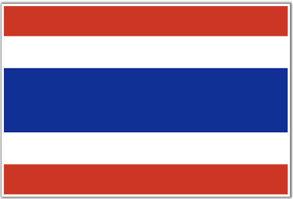
A Thai Limited Company is governed by the Alien Business Law which provides that foreigners may only own 49% in a Thai company. However, company formation experts in Thailand devised corporations with foreign shareholders holding the majority of the voting rights to take control of the company. Therefore, while foreigners cannot own a majority of the shares, they can have a majority in the votes by shareholders in order to manage the company. The Articles of Association can provide this type of management structure.
The Thai Limited Company also provides its shareholders with limited liability.
Background
Thailand is a country located in the center of the Indochinese peninsula of Southeast Asia. Its official name is the “Kingdom of Thailand” and was formerly known as “Siam”.
Politically, Thailand is a constitutional monarchy with a democratically elected parliament. The prime minister is the head of government and leader of the majority political party. The king is the head of state exercising sovereign powers through the courts, cabinet, and the parliament as prescribed under the constitution.
Benefits
A Thai Limited Company offers the following benefits:
• Foreign Control of Companies: Although, foreigners may only own 49% of the shares, they can have a vast majority of the shareholders’ voting rights and can be appointed as the directors in order to manage and control the company.
• No Minimum Capital: There is no minimum required capital.
• Limited Liability: The liability of the shareholders is limited to their contributions into the share capital.
• English: English is a very popular language spoken by many citizens and residents.
Thai Limited Company Name
Thai companies must select a unique company name not already being used by another company in Thailand. The proposed company name can be reserved with the Ministry of Commerce for 30 days before filing an application for the new limited company.
Limited Liability
Shareholders’ liabilities are limited to their share capital contributions.
Company Objectives
Thai companies must provide a declaration of its objectives which cannot be contrary to good morals and the public order.
The Ministry of Commerce provides a standard list of typical business objectives consisting of 40 provisions including owning real property. Many new companies simply adopt the standard form as their own objectives.

Registration
The first three steps for registering a new company are:
• The first document to be filed at the Ministry of Commerce is the executed Memorandum of Association.
• Then, all of the subscribed shareholders must pay up by at least 25% of their value. This must be verified by a local bank showing the share capital deposit.
• The promoters must demonstrate their holding at least one share in the company.
After the initial three steps, the promoters call for a Statutory Meeting of the subscribers. The agenda for the meeting will include:
• Adopting the Articles of Association;
• Ratifying the promoter’s actions and expenses;
• Considering the compensation paid to the promoters;
• Appointing the directors;
• Establishing the preferred shares;
• Considering the number of allotted shares and whether partially or fully paid up with cash and like valued assets;
• Appointing an auditor and amount of compensation.
After the Statutory Meeting, the directors may begin managing the business. A call will be made for the payment of the shares.
Then the Articles of Association and a list of the shareholders will be filed with the Ministry of Commerce. It may take 3 to 5 business days for the Ministry of Commerce to approve the list of shareholders and the Articles of Association.
Memorandum of Association
Within 30 days from approval of the new company, a Memorandum of Association must be prepared and filed with the Ministry of Commerce. The Memorandum must include the following information:
• Company name and location;
• Details of the company’s objectives;
• Authorized capital, number of shares to be issued, and their par value; and
• Each promoter’s full name, address, nationality, age, occupation, and signature along with the number of shares subscribed to each shareholder.
Shareholders
As mentioned above, 51% of the shares must be held by Thai nationals and residents. The remaining 49% can be owned by foreigners. A company must have a minimum of 7 shareholders who can be natural persons or corporations of any nationality and residing anywhere.
Only for par value shares may be issued and the minimum share value is 5 Baht (currently 15 cents USD). Shares can only be issued as either ordinary or preferred shares. The Articles of Association describes what rights are associated with the preferred shares.
For the protection of the foreigners, two classes of shares are recommended:
1. The Thai shareholders have preferred shares where their rights are limited such as voting rights, limited rights to the assets, and limited dividends.
2. The foreign shareholders have ordinary shares where they possess greater rights such as all of the voting rights, greater access to the assets. Higher dividends, etc.
Unless the Articles of Association state differently, the shares can be transferred without the other shareholders’ or the company’s consent. Both types of shares are transferred by delivering a Share Certificate. Both the transferor and the transferee must sign a document acknowledging the share transfer. Each signature must be certified by at least one witness. Once the transfer of the shares is recorded in the Register of Shareholders it becomes valid.
Directors
There are no requirements for a minimum number of directors. They can be of any nationality residing in any country. They do not have to be shareholders.
It is recommended that all of the directors be foreigners for better control of the management of the company as the does not require resident directors.
Authorized Directors
The law requires at least one “authorized” director be chosen from the directors to sign documents on behalf of the company. This is akin to a “legal representative” authorized to act on behalf of the company. The authorized directors can be of any nationality, however, one or more should reside in Thailand to be contacted by government officials to sign legal documents.
Minimum Capital
There is no required minimum authorized share capital.
However, in order to obtain a work permit for a foreign employee, the law requires a minimum capital of 2 million THB (currently $60,000 USD) for each foreign employee.
Registered Office
Every company must keep a registered office address in Thailand. This must be done prior to applying as a new company and registering with the tax authorities, applying for a foreign employee’s work permit, and opening a local bank account.
Accounts
All books and account records must be maintained at the registered office. They must show a true and accurate accounting of the sums received and spent by the company. The assets, liabilities, profits and losses must be demonstrated in the books and account records.
A company’s auditor must review the balance sheet showing the profits and losses and submit a report at the annual general meeting of the shareholders. An audit of the accounts must take place once a year and a report filed with the Commercial Registration’s Revenue Department.
Taxes
The Thailand corporate tax rate on profits is 20% for 2017.
Time for Formation
It may take up to two weeks for the entire formation and registration process to be completed and approved.
Conclusion
A Thai Limited Company provides these benefits: foreigners can have the majority of shareholder’s voting rights and all of the directors to control the company, limited liability, no minimum share capital, and English is very popular.


